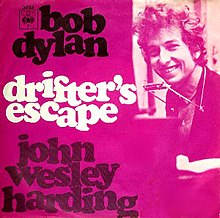Drifter's Escape
| "Drifter's Escape" | ||||||||||||
|---|---|---|---|---|---|---|---|---|---|---|---|---|
 |
||||||||||||
| Single by Bob Dylan | ||||||||||||
| from the album John Wesley Harding | ||||||||||||
| B-side | "John Wesley Harding" | |||||||||||
| Released | December 27, 1967 | |||||||||||
| Recorded | October 17, 1967, Studio A, Nashville, Tennessee | |||||||||||
| Genre | Rock, folk rock | |||||||||||
| Length | 2:52 | |||||||||||
| Label | Columbia | |||||||||||
| Writer(s) | Bob Dylan | |||||||||||
| Producer(s) | Bob Johnston | |||||||||||
| Bob Dylan singles chronology | ||||||||||||
|
||||||||||||
|
||||||||||||
| 12 tracks |
|---|
|
"Drifter's Escape" is a song written by Bob Dylan and released on his 1967 album John Wesley Harding. In some European countries, including the Netherlands, Norway, Sweden and Denmark, it was released as a single in 1968 backed by "John Wesley Harding". It was released as a single in the US in 1969 as the B-side to "I Threw It All Away". The song was recorded in four takes on October 17, 1967.
Dylan wrote "Drifter's Escape" on a train in New York while traveling to the first session for the John Wesley Harding album. The lyrics provide a Kafka-esque narrative in which an outsider is oppressed by society, but not defeated. The protagonist is put on trial without knowing what the charges against him are. The judge is sympathetic, but powerless. The jury finds the protagonist guilty, but he is saved through divine intervention when the courthouse is struck by lightning. The protagonist is able to escape as his persecutors fall to their knees in prayer. Dylan leaves the orientation of the protagonist and the deus ex machina ambiguous. The protagonist could be a prophet freed by God, or he could be a false prophet freed by the devil.
Several commentators have pointed to parallels between the song's story and Dylan's own experiences around the time he wrote the song. The drifter does not understand the charges against him, just as Dylan did not understand the criticism he received for moving from folk music to rock music. The jury "cried for more", just as Dylan's fans who followed his path to rock music became more oppressive. And the lightning bolt that allows the drifter to escape could be a metaphor for the "motorcycle accident" Dylan suffered in 1966. Another theme that comes through in the song is Dylan's hatred for mob violence.
Biographer Clinton Heylin has noted that in writing "Drifter's Escape", Dylan found a new, economical style that allowed him to tell a five-act story in just three verses. He then went on to write more songs in a similar manner, which formed the bulk of the John Wesley Harding album.
Dylan did not perform "Drifter's Escape" live for almost 25 years after it was written and released. He first performed it live in Oregon on April 30, 1992, a day after the Rodney King verdict. He sang it again four days later in San Francisco, at which point the lines:
...
Wikipedia
